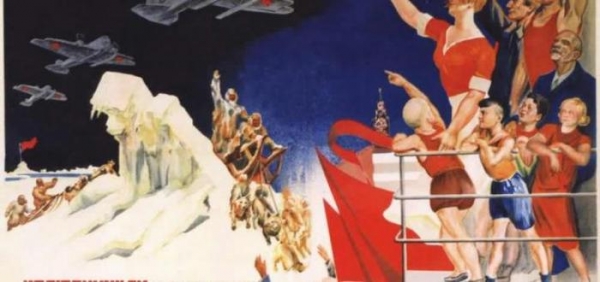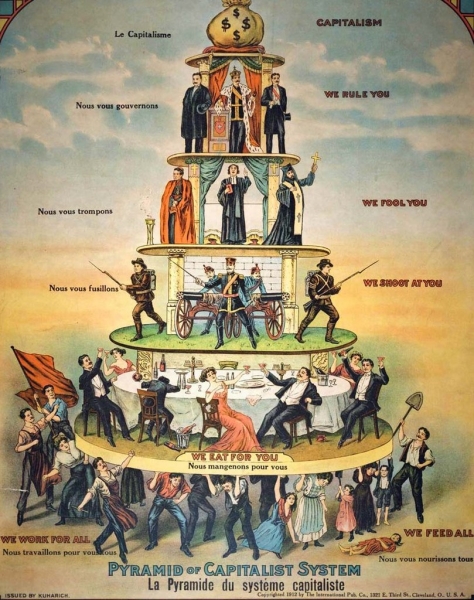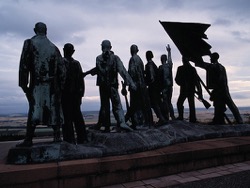
Historian Pavel Kudyukin about the fate of democratic socialism
Bernard Shaw first coined the term “democratic socialism”. Since 1920-ies it stable used by the German social Democrats, the Russian Mensheviks and social revolutionaries. Then, with 1951, he officially entered in the Frankfurt Declaration, on which was built the Socialist international. The idea that there is no democracy without socialism (and Vice versa) was extremely important. The preservation of democracy as a way of development of society were the basis of the struggle of the socialist-revolutionaries and Mensheviks with the Bolsheviks.
In the framework of lectures about the development of ideas and practice of social democracy, and also about possible social democratic future of Russia and the whole world told historian and activist of the Russian and Belarusian social democratic movement Pavel Kudyukin. “Ribbon.ru” wrote down the main points of his speech.
Three different understanding of socialism
The problem of the relation of democracy and socialism have a long. To some this will seem obvious tautology, since for many supporters of this theory socialism cannot else but democratic. On the other hand, someone thinks this statement is a classic oxymoron, like, democracy and socialism — these are things incongruous and democratic socialism in nature and does not be.
And apologists of Soviet-type societies, and the extreme anti-Communists believe that such a system could be realized only in this form, as in Stalin’s USSR, China under Mao, in North Korea. He allegedly was and will be built and maintained only by methods of severe repression and violence. However, the extreme supporters of communism say that they have a democracy too, just expressed in a different form — socialist, proletarian, and so on.
But, first, socialism refers to at least three related, but not quite matching things. First of all, is a set of ideological ideas about post-capitalist society or a society alternative to capitalism. Experts on the history of Russian utopian socialism Alexander Volodin and Boris Shakhmatov at the time defined it as a positive anti-capitalism.
The second definition of socialism as a movement, a set of different kinds of organisations, initiatives and actions are directed by ideas and views on the future non-capitalist society. The third objective process of accumulation in capitalist society certain elements of a future post-capitalist society.
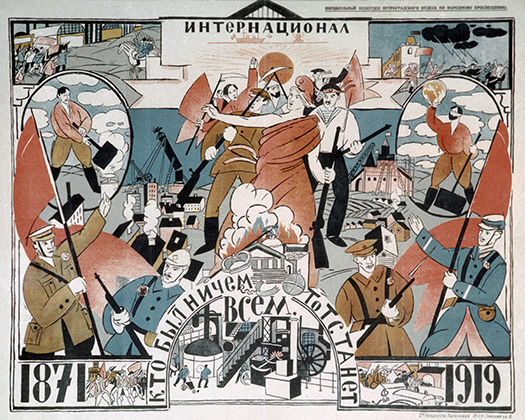
Reproduction of a poster by an unknown artist the “Internationale. Who was nothing will become everything”
Image: RIA Novosti
Not all socialists recognize it at all in principle possible, but many believe that in the framework of capitalism begin to form some kind of post-capitalist elements included in the contradiction with him. It will sooner or later lead to a qualitative transition, when we can say that we live in a new society.
Is a lot of debate about when this transition will occur. Some say it has already happened, and capitalism as such anymore, someone brings it in more or less distant future. But given this diversity of definitions under the concept of socialist movements and concepts covered is quite large and an indefinite multitude, which is quite difficult to delineate the boundaries. Inside this set there are very serious differences.
Why early democracy similar to a dictatorship
If to speak about modern democracy that is born in the great revolutions (first of all, the eighteenth century in the United States and France), it is theoretically grounded in the concept of Jean-Jacques Rousseau. This democracy is not what we now understand under it, because it comes from a belief in the existence of universal will, expressing the interests of the people and which is its expression.
Moreover, according to Rousseau, the “General will” is not the same thing as “the will of the majority”. The concept (embodied, primarily, in the Jacobin dictatorship), is a very undemocratic democracy. It is assumed that someone has determined the General will, and those who do not conform, become enemies of the people, and they must be suppressed as anti-people, anti-democratic elements.
How then will show practical experience, universal suffrage is in itself no panacea for all problems. It does not lead to the election of those people who could be regarded as spokesmen of interests of the majority. Perhaps it is most vividly manifested itself during the revolution of 1848 in France, when, in the words of Alexander Herzen, revolution “stab myself” universal suffrage.
The results of the elections, when the majority had received not Republicans, Democrats or socialists, and representatives of various monarchical parties. Besides, the first country (the United States not among them), where is the beginning to introduce universal suffrage, were not at all democratic (France under Napoleon III, Germany under Bismarck).
It turned out that by themselves the democratic mechanisms do not guarantee a reflection of the interests of the majority, the more that it itself starts to blur. In the Communist Manifesto Marx and Engels write: “the First step of the proletariat — the conquest of democracy.” Here it is understood not in the usual form, with the pluralism and freedoms, and the dictatorship of the majority, and it is organically connected with the idea of dictatorship.
The idea of the dictatorship of the proletariat in early Marx, apparently, borrowed largely from Louis Auguste Blanqui. The difference here is only that the Forms it is a dictate of enlightened and enlightens the minority at the time, before people will be Mature enough to take power into their own hands.
The classic example is the late, deeply sick Lenin, constantly thinking about the fate of the Russian revolution and the Bolshevik dictatorship. It gives rise to non-trivial idea: we take the power, and from a position of power pulls the company to ensure that it could become socialist. In his article “our revolution” it is, in fact, reproduces the same blanket the idea of the dictatorship enlightening, lifting to the required level of the society. But experience shows that it quickly degenerates, and even if educational ideas in the beginning and are then quickly fade into the background.
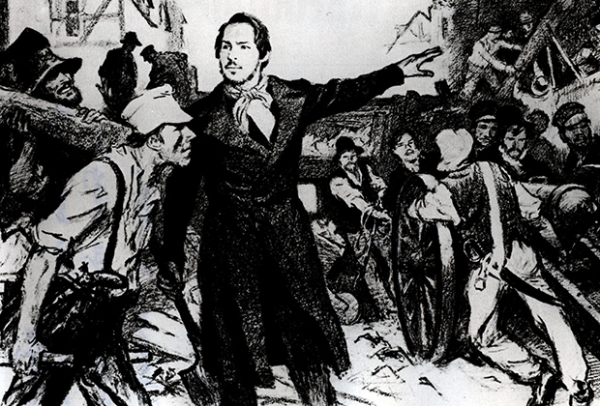
Friedrich Engels directs the construction of barricades in the streets of the Prussian city of Elberfeld, 1849
Photo: World History Archive / Globallookpress.com
Interestingly, it was Lenin himself predicted, long before the capture of power. In 1905 he wrote: “Who wants to go to socialism by a different road, in addition to political democracy, one inevitably comes to is reactionary and ridiculous (both politically and in an economic sense) conclusions”. However, in the more Mature Marx and Engels, which took into account the experience of the 1848-49 revolutions and post-revolutionary development, clarifies the understanding of the dictatorship of the proletariat. It is a temporary emergency or revolutionary power, or in a broader interpretation of just a synonym of class rule.
Why socialism is inseparable from democracy
The principal difference of socialism from capitalism is that the first is not indifferent to the political regime. It is a society where eliminated exploitation, oppression and alienation of the situation. It is expected that this achievement is possible on the basis of public ownership. The apologists of Soviet-type society say that a state which expresses the interests of the proletariat or of the whole people, carry out such governance on behalf and in the interests of society.
But whether the power to which the company is not affected, to Express its interests? As a coincidence, probably, maybe, but as a systematic phenomenon — no. A state which is not elected and presses trying to show independence of citizens, obviously, did not represent the people. It can do so only if provided with basic democratic principles (not necessarily Western-style).
Primary democracy in relation to socialism because it is, though limited, is possible without socialism and socialism without it — no. It was not immediately consciously socialist movement, because, first of all, a significant part of socialist concepts has long been apolitical. For example, in Russia, the first organization that realized the importance of democracy (at least as a prerequisite and a tool of socialism) was “Narodnaya Volya”.
Similar processes occurred in the West. So, in a letter to Eduard Bernstein in 1884 Engels writes about the importance of democracy as a means in the struggle for socialism. But it is very ambiguous said about democracy itself, on the grounds that it is historical and changing notion. “The proletariat for the mastery of political power also need democratic forms,” he writes. These form for him the means, and after mastering the power they need. Further he says: “If any now aspire to democracy as to the purpose, he must rely on the peasants and petty bourgeois, that is, classes that were doomed and because they want to artificially preserve themselves, are reactionary in relation to the proletariat”.
Viktor Chernov in 1933 in an unpublished paper “the End of Marxism” is pretty thoroughly deconstructed the duality of the relationship of Marxism to democracy, showing that it is largely rooted in the “industriezentrum” of Marxism — the idea that only the full development of capitalism, the stratification of society into bourgeois and proletariat, creates the preconditions for socialism. Practice has shown that things are not quite right — in particular societies (except for a relatively short period in the UK) the industrial proletariat has never constituted the majority in society.
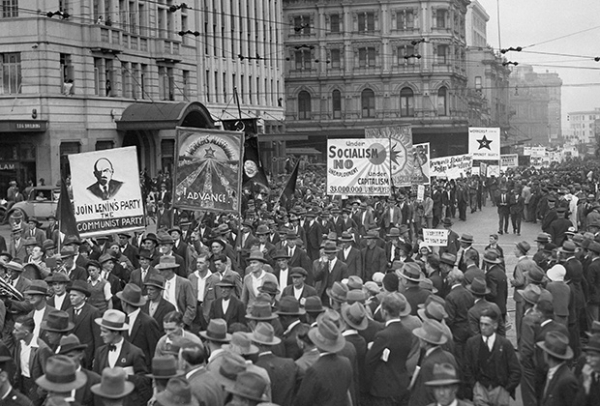
A demonstration against unemployment in Sydney (Australia), 1931
Photo: Scherl / Globallookpress.com
However, he is extremely heterogeneous and its political (including electoral) behaviour is determined not only objective socio-economic status. Thus, a significant part of the same industrial workers in all countries had not voted for the socialist party.
This behavior continues to exist. In France a significant part of French workers voted for the national front, and in Russia the considerable part of workers in the industry voted for the LDPR and United Russia. This refutes the idea that in the presence of electoral rights and the majority of the proletariat there will be an automatic movement in the direction of socialism.
In the further development of the ideas of the Italian Marxist philosopher Antonio Gramsci develops the idea of hegemony as the influence of those or other classes for most, as the mechanism for the formation of large interclass coalitions. Karl Kautsky after the Russian revolution said that the issue of transition to socialism is the question of the formation of some social associations. So, you can’t base its policy exclusively on the working class, we have to find social alliances, take into account the interests of different population groups. This is the best way usually occurs in a democratic regime, when such public groups have the opportunity to shape their political representation, engage in dialogue and develop some social compromises.
Liberalism also made many of the freedom of man, but the socialists took the next step by putting the question about the material foundations of this freedom. Can be free a man who is ready to sell their freedom for bread? Can a man facing all his time to work for a living, to be fully conscious, responsible citizen and find the time for social activity?
A popular slogan of the struggle for the eight-hour day “eight hours for work, eight hours for sleep, eight hours to development and civic engagement”, indeed, creates some background material for the filling of formal democracy with real content. In this regard, democratic socialism raises the question of what democracy is not limited to the political sphere, but is a much broader concept that includes all the great features of participation in determining what affects your life, in discussion and decision making. Therefore, the democratic socialists say that democracy must be not only political but also economic, social, cultural.
The experience of the Russian revolution and the subsequent development of Soviet society, the experience of the formation of the Soviet type societies (mostly Eastern and Central Europe, China, Cuba) has exacerbated the problem, as a result of the existence of which without democracy is not socialism, but something else, although not necessarily capitalist. Formed a society that remains, and in many cases tougher, exploitation and oppression.
Criticism of Soviet society and of the Bolshevik phase of the Russian revolution began very early, though, including quite consistent with socialist views. Known the manuscript of Rosa Luxemburg: “Freedom is always the freedom of dissent”, and it contains a very clear prediction of what will degenerate Bolshevik regime.
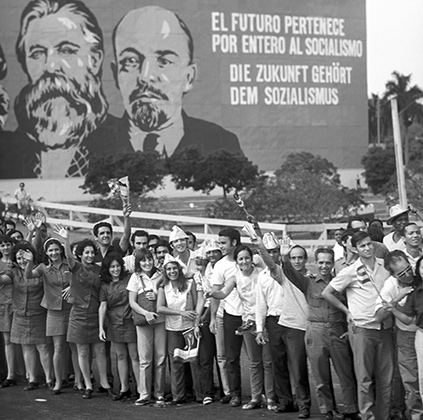
The Cubans met the GDR leader Erich Honecker, 1974
Photo: ddrbildarchiv.de / dpa-Zentralbild / Globallookpress.com
Crisis of ideas of social democracy
The majority of proponents of modern social democracy came to a rather hazy understanding of democratic socialism as a kind of perpetual motion to the infinitely receding horizon. That is, we are gradually expanding political democracy, workers ‘ rights, implement the elements of the state and public regulation of economic life, eliminate the most egregious manifestations of social inequality, and so in the future capitalism turns into something else.
For others, this term was sufficiently definite, characterized by its economic system, social system, which can be achieved in the foreseeable future. For example, in the 60’s — early 80-ies of the last century this was expressed most clearly in the southern European socialism in the French Socialist party, the Greek PASOK (Panhellenic socialist movement) and the Spanish socialist workers ‘ party in the concept of democratic self-administrative socialism.
This concept crashed in the early 1980’s, when the French socialist party came to power. It was found that such a model is unrealizable within the framework of one country alone. The failure of the French socialists stressed going from the last century, the question of whether socialism in one country, or it requires a much wider context, transnational or supranational. Besides, about 70 years, capitalism has become greatly transformed, becoming transnational, breaking national boundaries, creating transnational centres of power and decision-making that led to a serious crisis of traditional concepts of state and democracy.
Until the end of 70-ies it was possible to talk about the expansion of democracy, at least in the developed part of the world. But since the neoliberal wave of Thatcherism in the UK, Reagan in the U.S., we have seen an increasing erosion of democracy, its formalization and the deep crisis that poses a very serious challenge for people who consider themselves supporters of socialism. Here it is necessary to look for ways of struggle for the filling of democracy with real content, not only at the national level.
Socialist movement almost from the very beginning declared its commitment to internationalism, at the same time, each time, when life demanded to manifest it in reality, it often was hard. At best it was mere lip service, at worst — was the transition to the national state interests against the broader, international. Now in this respect, there is a deep crisis of democratic socialism, as we begin to formulate and understand the problem, but is not yet able to offer solutions.
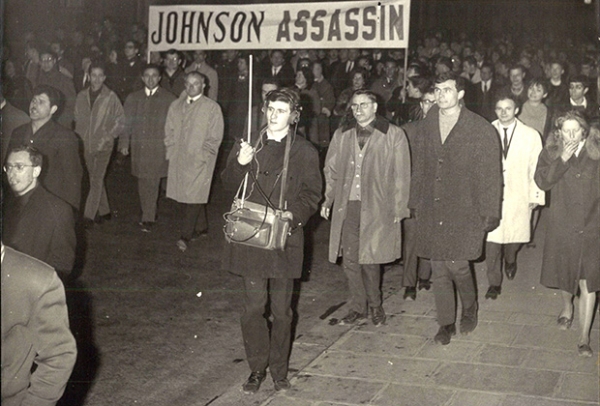
The French Communists organised a protest against the Vietnam war at the walls of the U.S. Embassy in Paris, 1957
Photo: Keystone Pictures USA / Globallookpress.com
We need to find new forms of organization, because once again the old forms, which showed to be ineffective, largely formalized, too — look at the same structures of the socialist international. For example, after the revolutions in the Arab countries, the socialist international had to exclude from their ranks of the party of ousted Tunisia and Egypt, which “suddenly” turned out to be undemocratic and inconsistent with the principles of the international.
Post-capitalist future
It is difficult to attract to their side the most. Alas, without such involvement, we get a society that is democratically transferred to a new, post-capitalist state. But I am convinced that the alternative to democratic socialism is rather a sad future. Capitalism will evolve, and not in the direction of greater humanism, democracy, equality. Unless socialist democratic counterweight, then we have a movement to arahidonovoy very rigidly segmented society, the type described in the time Machine by H. G. wells. Some elements of this are already visible in the present.
We can assume that post-capitalist society will become not economic phenomenon, but something else. The economy will be present, but its role is greatly reduced. Marx in “Capital” expressed the idea that in the future the company your free time will become a measure of social wealth and labour as a forced activity will die off or drastically reduced, to the place of forced labour will come creativity. But the question is whether we will come to this society in the development of the world after Marx showed that socialism is possible, but not inevitable.
In the current situation can hardly be said about the transition to socialism within one country, even as big as Russia. We are in a serious economic crisis, but he has not passed neither in social nor in political stage. However, this process can happen very fast and explosive, because revolution always comes unexpectedly. The trouble is that the revolutionaries, as a rule, are prepared even to the last, and the last revolution.
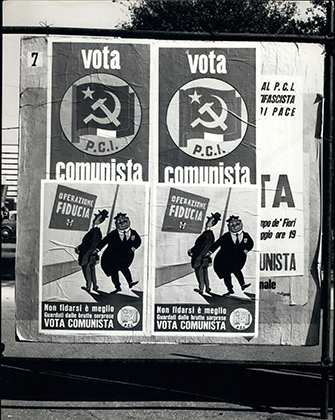
Leaflets Communist party of Italy posted in Rome before the election, 1954
Photo: Keystone Pictures USA / Globallookpress.com
Even in the classic welfare States in Western Europe becomes increasingly relevant, the idea of a new social state with the light of experience, with a smaller role of government paternalism and greater social self-organization, and bottom, and not forced of social solidarity. This is not a replacement for democratic socialism, but it could be an important step in the direction to it.
A big problem of Russia — its economy with cheap, undervalued labor. Real wages in the country even in the best years lagged behind the growth of its productivity. If there is cheap labor, then there are no economic incentives for technological and technical progress, to improve the quality of management and organization of production. In this respect, the struggle for the transition to the economy of a well-paid job is a struggle including the rapid modernisation of the Russian economy.

